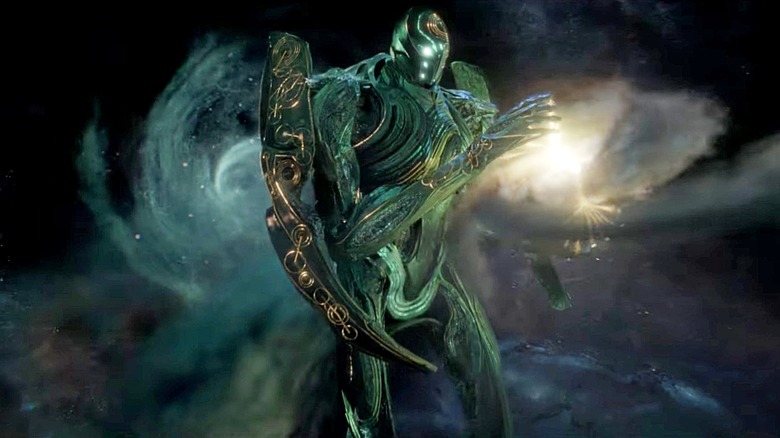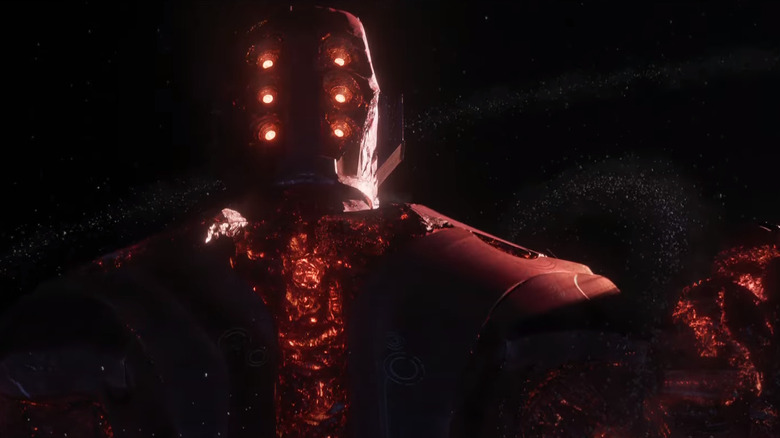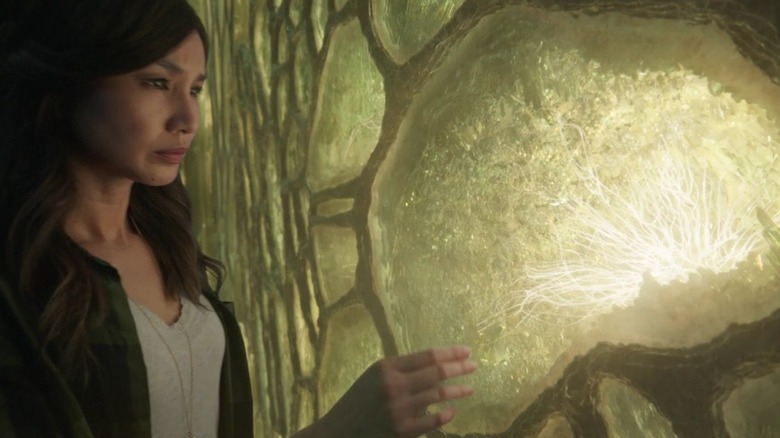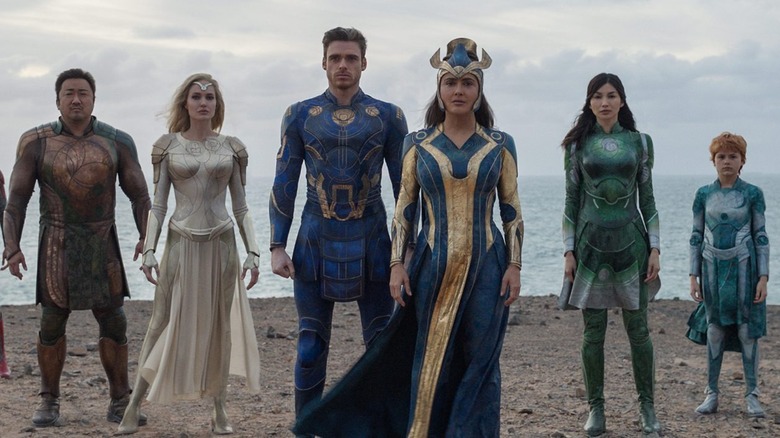Eternals Drops A Huge Clue About Its Twist In The First 10 Minutes
Warning: spoilers for "Eternals" follow.
Chloé Zhao's "Eternals," now available to watch on Disney+, stands apart from the other films in the Marvel Cinematic Unvierse. The central gimmick of the MCU is, after all, its interconnectivity. Every film stands not as a singular feature, but as an episode of a long-running high-octane TV series wherein each chapter will eventually come to bear on later chapters in the series. The films are replete with hints about what's to come, and when a new character is introduced, fans of the series can begin wiggling with the excitement of seeing that new character eventually interact with older ones (and now, with the multiverse in play, characters can now even interact with parallel versions of themselves).
"Eternals," contrary to this design, is about characters who deliberately don't interact with other superheroes. They essentially abide by the Prime Directive from "Star Trek"; that is: The Eternals live by code of noninterference, only becoming involved with human development if they are either being attacked by giant mutant monsters called Deviants (from which the Eternals will defend humans), or if humanity requires a little push to aid in the development of its civilization (in one scene, the Eternal Phastos, played by Brian Tyree Henry, invents the plow, kicking off an agrarian era in Mesopotamia in the 6th century BCE). Elements of this story will sound familiar to anyone who has read Arthur C. Clarke's 1953 novel "Childhood's End."
"Eternals" also stands apart from other Marvel movies in its drastically different tone. "Eternals" is comparatively contemplative and poetic, putting its superhero characters firmly outside of Marvel's usual mold of militant soldiers or costumed vigilantes. The Eternals are aloof storytellers, who have an abiding, aching love for humanity and, in some cases, each other: They're notoriously the first Marvel characters to have sex on camera. They are interested in ancient history because they were a part of it, and love poetry.
It's that love of poetry that drops a hint about a major "Eternals'" twist.
Arishem's Plan
The Eternals serve an impossibly ancient and incredibly vast space creature called Arishem, who has a millennia-long-term plan for the them, only known by the team's leader Ajak (Salma Hayek). About halfway through "Eternals," when Ajak has died and Sersi (Gemma Chan) has to take over as leader, do we get to learn what that plan is. Arishem reveals that it belongs to a species of ineffable space deities called Celestials who are responsible for creating the planets in the universe by hand. All living things come about by the interference of the Celestials. When a Celestial is born, it hatches out of the core of a planet. The Earth — the planet itself — serves as an egg to an unborn Celestial, and the Earth will be destroyed when it hatches.
Humanity will die, but the birth of a Celestial will ensure the invention of hundreds of new civilized worlds. Arishem reveals to Sersi that the Eternals are, in fact, artificial beings, built specifically to not evolve into a new species; when you're dealing with a job that lasts literally millions upon millions of years, evolution would be a concern. The Deviants were originally meant to serve a similar function as the Eternals, but they evolved too much too often.
This is not only an enormous, awe-inspiring twist in the plot, but establishes a far-reaching canon of gods in the Marvel world. The piddling exchanges between multiple Spiders-Men seems like small potatoes when gazing into the enormity of the universe's creation. Marvel's canon of deities (colloquially called Cosmic Beings) is now being addressed in its films, which, one would hope, will mean bringing up issues of theology, philosophy, and, yes, poetry.
Walt Whitman
Early in "Eternals," we catch up with Sersi in the present day. She visits her human boyfriend Dane Whitman (Kit Harrington) who works at London's Natural History Museum. When she first walks in on Dane, he is reciting from the first stanza of Walt Whitman's "Song of the Universal," one of the many poems from "Leaves of Grass" (initially published in 1850, then expanded considerably in 1892). The passage he recites is thus:
In this broad earth of ours,
Amid the measureless grossness and the slag,Enclosed and safe within its central heart,
Nestles the seed perfection.
Whitman was evoking the perfection he felt humanity was now capable of achieving, keying into a time in America when the arts were transitioning from realism to a movement called transcendentalism. Whitman blended the real, the earth, and the human body, directly into the energies of the divine (read "I Sing the Body Electric" sometime). The passage from "Song of the Universal," as it's used in "Eternals" is not only literal — there is literally a seed perfection nestled in the broad Earth — but a direct clue as to what is happening with the Earth. Writer/Director Zhao and her co-screenwriters Patrick Burleigh, Ryan Firpo, and Kaz Firpo evoke Whitman's words to clue the well-read audience into what might be happening.
The Emerald Tablet
The Whitman poem — recited by a character named Whitman, hmm — was not the only hint about the Celestials that Zhao dropped in either. The other hint requires a little bit of knowledge about Babylonic history, however. In the Babylon sequences of "Eternals," the character of Makkari (Lauren Ridloff) makes mention of The Emerald Tablet. The Emerald Tablet of Hermes, or the Tabula Smaragdina, is an ancient text that was likely first written about 750 CE and contains the basis of a lot of the period's alchemical practices. The Emerald Tablet is the source of the phrase "as above, so below." It's also the source of the medieval notion that gold can be made artificially, and that there is way to create a Philosopher's Stone.
Here is a translation of The Emerald Tablet, taken from an ancient Arabic transcription by Jabir ibn Hayyan, and translated into English by Eric J. Holmyard:
Truth! Certainty! That in which there is no doubt!
That which is above is from that which is below, and that which is below is from that which is above,
working the miracles of one [thing]. As all things were from One.
Its father is the Sun and its mother the Moon.
The Earth carried it in her belly, and the Wind nourished it in her belly,
as Earth which shall become Fire.
Feed the Earth from that which is subtle,
with the greatest power. It ascends from the earth to the heaven
and becomes ruler over that which is above and that which is below.
"The Earth carried it in her belly?" "It ascends from the earth to the heaven and becomes ruler?" These are all pretty open allusions to a powerful space deity nesting in the heart of the Earth. Whether or not ancient humanity knew about Arishem's plan to use the Earth as an egg for another Celestial is unclear; perhaps the author of The Emerald Tablet somehow knew about the Celestial gestating at the planet's core. Zhao certainly reached into ancient poetry to give plot hints to a modern audience.
Perhaps more ancient hints will be clarified in another "Eternals" film. Well, should Zhao, ahem, deicide to make one.



